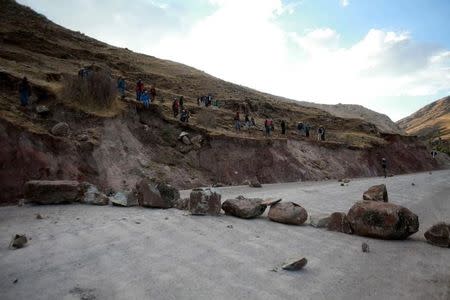Peru asks Las Bambas copper mine to resubmit environmental plan
LIMA (Reuters) - The government of Pedro Pablo Kuczynski has asked MMG Ltd's copper mine Las Bambas to seek fresh approval for its environmental plan to correct any possible shortcomings, the vice president said Wednesday. Martin Vizcarra said Las Bambas, one of the world's biggest copper pits, would be able to operate as usual while it prepares an "integral" environmental impact study - part of the new government's bid to rebuild trust with local communities following deadly protests that suspended exports in October. Previous governments approved the mine's original environmental plan and subsequent modifications that allowed its concentrates to be transported to port on local roads instead of through a pipeline as initially proposed. But residents in the highland region of Apurimac have said they were not consulted on the revisions and have protested pollution from hundreds of trucks carrying copper concentrates on unpaved roads near their communities every day. "We've asked the company to start the process of modifying its environmental impact study within three months," Vizcarra told Reuters after visiting Apurimac to hold talks with local leaders. "We want to prevent and correct all the mistakes or deficiencies that may have occurred." Vizcarra has been leading the government's efforts to ease tensions near the Chinese-owned mine but said it was too early to specify how its environmental plan might be revised, saying only that "everything that has been changed" was on the table and that local communities would be involved. Las Bambas representatives did not immediately respond to requests for comment outside of normal working hours. Vizcarra, who is credited with helping resolve a dispute over another large copper project when he was governor of an important mining region, helped end a stalemate with protesters near Las Bambas in October when a province-wide road blockage threatened to shut the mine down completely. A key road has remained blocked by four Quechua-speaking communities but the company has continued to use alternate routes to transport its concentrates, Vizcarra said. The government has proposed buying the land that the blocked road passes through from the towns for about 17 million soles ($5 million), Vizcarra said. That road and two others would then be paved. The centrist government of former investment banker Kuczynski, who took office in July, has also proposed about 2 billion soles ($588 million) in social and development plans to help poverty-stricken towns near Las Bambas, Vizcarra said. (Reporting By Mitra Taj, Additional Reporting By Teresa Cespedes; Editing by Richard Pullin)



